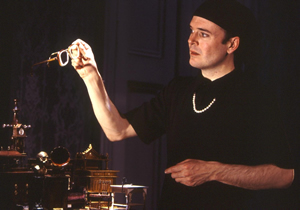
Capturing the Artifact
(An Editor's Note)
By Jonathan Kalb
I Am My Own Wife
By Doug Wright
Playwrights Horizons
I have now read half a dozen admiring reviews
of Doug Wright's I Am My Own Wife, all of them acute,
persuasive, and intelligent (including the two published on
HotReview.org), but none has mentioned what seems to me one
central aspect of the play's power and appeal: that it plays out
a wonderfully ambiguous twist on the genre of docudrama.
Consider this work as a theatrical counterpart
to the film Capturing the Friedmans, Andrew Jarecki's
richly disturbing documentary about a family destroyed by accusations
of child-molesting. Both Jarecki and Wright deal with subjects
readily condemned by others (Wright's focus is the famous East
German transvestite Charlotte von Mahlsdorf, who was also a Stasi
informer), and both share a deep appreciation of studied indeterminacy.
That appreciation is why questions about polemicism swirl around
each artist, ultimately dissipating for lack of evidence either
way. I Am My Own Wife may be a brilliant solo performance
by Jefferson Mays, a fascinating portrait of gay survivalism,
and a moving self-exploration by Wright--all of which has been
said--but it is also a peculiar documentary "trial" of sorts in
which the playwright turns out to be ambivalent about submitting
his suspect to our judgement.
To imply in the end, as Wright does, that
Charlotte is to be treasured primarily as a walking museum (largely
because she runs a museum of old furniture and furnishings, and
is something of an antique herself) simply won't do. Too much
evidence about possible untruths and half-truths has been presented
by then for us to dismiss it, and such factual tidbits are always
mildly alluring, if not titillating, in the information age. Moreover,
the playwright has already protested too much about not
judging his subject: "I've no right to sit in judgement," says
Mays, speaking in Wright's voice. The effect of this remark is
to ensure that the genie of judgement will never go back in the
bottle, no matter what is said. It's as if part of Wright thought
he had written a neatly self-referential play about writing a
play on a difficult historical subject, but another part knew
he had written a messily ambiguous report on his own strenuous
efforts to withhold judgement as a researcher and playwright.
There are of course plenty of works that
are ruined by their authors' ambivalence, but this is one that
was saved by it, primarily because the play is built on impersonation.
In a sense, the drama itself is dressed in a sort of "drag." Its
preoccupation with judgement marks it as a moralizing project
in the mold of Miller's The Crucible, Bentley's Are
You Now or Have You Ever Been?, and Hochhuth's The Deputy,
but its decided effort to blur the line between victim and perpetrator
marks it as a relativistic project in the tradition of Kipphardt's
In the Matter of J. Robert Oppenheimer and Anna Deavere
Smith's Fires in the Mirror and Twilight: Los Angeles,
1992. Which tendency is the heart and skin of the play and
which is its "costume"? That's just the undecidable point.
And perhaps this is part of what disturbed
the writer Alexis Greene, who remarked in her HotReview.org
article that she found Charlotte "fascinating, but veiled and
not quite human" and that "we rarely glimpse [her] soul." Being
fully human, to Greene, apparently means being morally accountable.
Yet the humans who mean the most to us, Wright seems to be saying,
are not necessarily so accountable; it's precisely there, in their
unaccountability, that their humanness resides. Hence Wright's
quintessentially theatrical impulse to embody such a person (or
have Mays embody her) as meticulously as is humanly possible.
